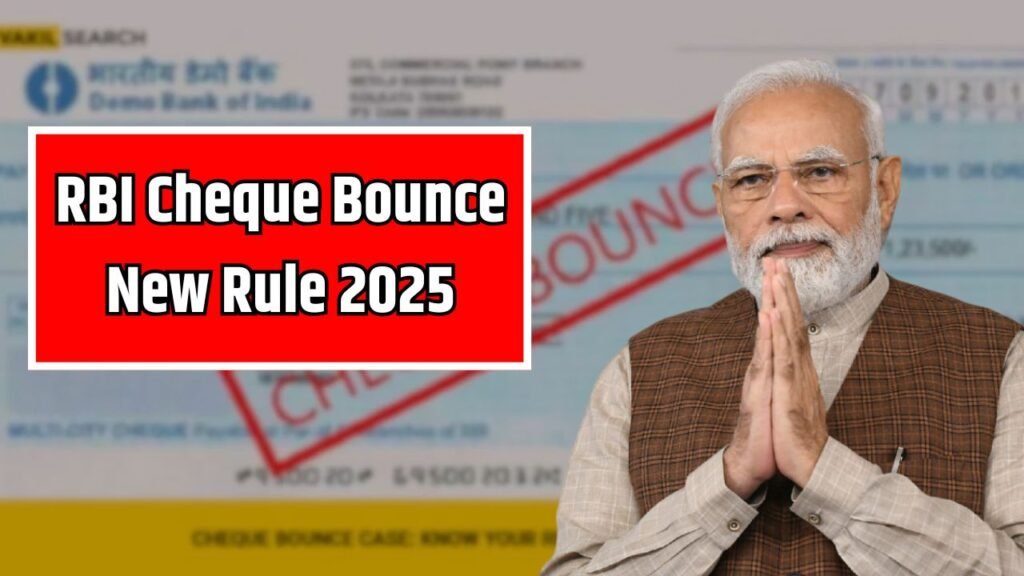Cheque payments are still a key part of business and personal transactions in India. Even though digital payments like UPI and net banking are growing, cheques are widely used in property deals, loan repayments, salary payments, and business settlements.
But cheque bounce charges have been a big headache for many account holders. The good news is that the Reserve Bank of India (RBI) has announced a new rule in 2025 that makes cheque transactions fairer and more customer-friendly.
What Was the Problem With Cheque Bounce Penalties?
Earlier, banks used to penalize customers for any cheque bounce, no matter the reason. Even small technical mistakes led to heavy penalties. For example:
- Signature mismatch
- Overwriting or corrections on the cheque
- Poor image quality during scanning
- Faded or unclear ink
In all these cases, the customer had to pay a penalty even if there was enough balance in the account.
This was especially unfair to small businesses, self-employed professionals, and common customers who had no control over such technical issues.
The New RBI Cheque Bounce Rule 2025
The RBI has made cheque rules more customer-friendly.
According to the new rule:
- Banks can charge penalty fees only when the cheque bounces due to insufficient funds or other account-related reasons.
- If the cheque fails because of technical errors, customers will not be penalized.
Here’s a quick comparison:
| Reason for Cheque Bounce | Earlier Rule (Penalty Charged) | New Rule 2025 (Penalty Charged?) |
|---|---|---|
| Insufficient balance in account | Yes | Yes |
| Signature mismatch | Yes | No |
| Overwriting/corrections | Yes | No |
| Poor image quality during scanning | Yes | No |
| Faded/unclear ink | Yes | No |
This means customers will now be held responsible only for reasons within their control.
Why This Decision is Important
Cheque bounce penalties are often ₹150 to ₹750 per cheque, and in some banks, even higher depending on the account type. If someone issues multiple cheques every month, these charges can become a big financial burden.
With the new rule:
- Customers are protected from unfair expenses.
- Banks must be more careful while processing cheques.
- Disputes between customers and banks will reduce.
- Trust in the banking system will grow stronger.
How This Rule Helps Customers
- Fair Banking System
Customers won’t be punished for technical mistakes outside their control. - Relief for Small Businesses
Traders, freelancers, and entrepreneurs can now manage finances better without worrying about surprise charges. - Better Relationship with Banks
Transparency builds trust between banks and their account holders. - Stress-Free Payments
Customers can issue cheques without the constant fear of being fined for minor errors.
Benefits for Businesses and Professionals
- Predictable finances – No hidden or unfair penalties.
- More confidence in cheque use – Payments can be done smoothly.
- Reduced disputes – Clients and suppliers feel more secure.
- Better handling by banks – Cheques will be processed more carefully.
Even large companies that issue thousands of cheques to employees, suppliers, or vendors will benefit from fewer complaints.
What Banks Need to Do
The RBI has also given clear instructions to banks:
- Notify customers immediately when a cheque is returned.
- Mention the exact reason for cheque rejection.
- Avoid charging penalties for reasons beyond customer control.
- Improve technical scanning and processing to avoid errors.
This ensures transparency and accountability in the system.
Limitations of the New Rule
While the decision is highly beneficial, customers must keep a few points in mind:
- Penalties will still apply if account balance is insufficient.
- Cheques with major mistakes like missing details may still be rejected.
- Digital payments are still faster and more secure for everyday use.
Why Cheques Still Matter in India
Even with UPI and digital banking, cheques remain important in:
- Property transactions and rentals
- Loan repayments
- Business payments for large sums
- Security deposits and guarantees
That’s why reforms like this are necessary.
Long-Term Impact of the Rule
- More confidence in cheque usage.
- Fair practices by banks.
- Stronger trust in traditional banking.
- A balanced system where both digital and cheque payments can coexist.
Final Thoughts
The RBI’s new cheque bounce rule (2025) is a big relief for customers. By ensuring that penalties are charged only when justified, the RBI has made cheque transactions more transparent, fair, and stress-free.
For customers, it means fewer disputes and reduced costs. For businesses, smoother financial management. For banks, greater responsibility in handling cheques.






